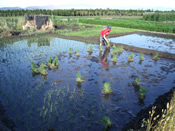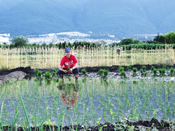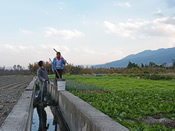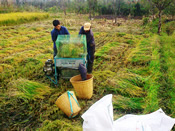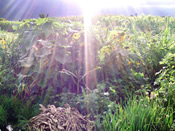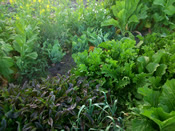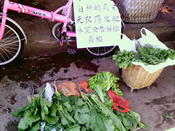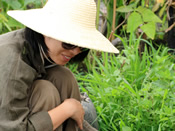
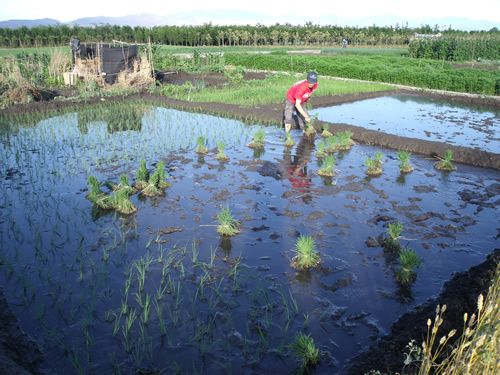 |
| Lao Wang diligently transplanting rice seedlings. (Ong Kee Kian) |
By Ong Kee Kian (A former urban-dweller who has been farming land in Dali, Yunnan for two years.)
|
Editor's Notes Ong Kee Kian, also known as 'Lao Wang' is a Malaysian who was posted to Shanghai by his employer, a timber import and export company, in 2002. The location had changed, but the nine-to-five work day stayed the same. After some reflection on life in a modern city, he determined to make a big change – to leave the city and become a full-time farmer in Dali, Yunnan Province. There, he found freedom, happiness and contentment in his new life. Below is his hearty account of his journey inward, to show the desirability of an agricultural life at a time when agriculture is being increasingly marginalised. |
When I worked in Shanghai, I felt the quick pace of economic development, and witnessed the wealth disparity in the community. People were living with unhealthy food, low-grade clothing and environmental pollution in this affluent city. Facing all these issues, I began to contemplate what tomorrow might bring. After four years of preparation, I resigned from my job in 2007, and joined charitable organisations in their rural development and poverty alleviation work, with a view to helping make a difference to the macro environment. In the course of pursuing public well-being, I recognised my own insufficiency and incapability. I also reckoned that this way of living is unsustainable when I have to rely on the provisions of others for my basic necessities. I dug deeper in my reflections, and came to an understanding that a lot of the problems were indeed food-related. In 2012, I joined a balcony farming programme organised by PCD’s Yunnan Office and learned a great deal about food-related issues and farming. I decided to put what I had learned into practice and to start all over again in Dali as a farmer.
Why choose such a way of living?
To put it simply, my wife and I wanted to become self-sufficient, especially where food is concerned. We reckoned that only self-sufficiency could gain us more freedom, which could then alleviate the pressures in life and, in turn, bring more happiness, not to mention the fact that cultivating our own land would supply us with delicious healthy food.
Now, we no longer need to shop for vegetables. Without that expense, we face less pressure to bring in money. Even though the saving is small, it is already enough to free me up spiritually and psychologically. Most importantly, it is such a delight to eat what my own hands have planted. The freshly cut vegetables are so yummy and I do not have to worry about their quality.
One mu [1] of farmland may seem like a very small plot, but in reality it contains an infinite supply of natural resources. We treasure our fields and land, and in turn our fields and land increasingly enrich our lives.
Exploration of skills and know-how during farming
"Since you have not farmed before, would there be a chance that you might have a crop failure?"
"Farming is hard labour, did you tough it out alright?"
Before we made the farming decision, we were not sure whether we could really change our way of living: from city to rural area, from white collar to farmer. However, if we were to wait until we had fully grasped everything, I don't think we would be anywhere near a farm in this life.
I remember clearly my first time working in a field. It was September. My landlord had leased us a very small plot of land to start on. The plot was really tiny, yet the landlord said, “Go try out first.” He gave us a look as if he was waiting to see how we would get on. We borrowed a hoe from the landlord too, so as not to spend any money, in case we gave up after a few days.
I was holding the hoe with my wife by my side. We were looking at the newly harvested maize field without knowing how to turn the soil properly. We summoned up our courage and asked the farmer next to our field. He was so nice that he showed us how. We spent a week turning the soil of that 0.1 mu of land.
I always believe that the best way to learn something new is from direct instruction. Farming is no exception. We picked Dali to start, because the fertile land and the good weather there is best for beginners to try their hands on. If the initial hurdles were too difficult, we worried that we might just give up. Besides, we had heard that Dali has a lot of city folks doing farming or organic farming there like us. We later found that most of them were simply leasing the land and hiring farm hands, therefore their knowledge of agriculture was limited. It was once our hope that the practitioners there could give us technical guidance, but we discovered that, as far as farming ability was concerned, we were on a par with them.
Consequently, the local Dali farmers became our best teachers and mentors. Not only did they generously show us their farming techniques, they also brought us vegetables. Without them, we would still only be inching along. Before I came to Dali, I had been reading about farming, including theories behind natural farming. I considered natural farming to be ideal, and I made up my mind that I would practice this farming method, a no-weeding method for lazy people.
I started in autumn. Dali was still hot and occasionally rainy. When the seedlings finally emerged, I was delighted. However, weeds were also growing rampantly. I was terrified and asked myself, “No-weeding method works, actually?"
And then we found a bigger plot of land. This low-lying field is wet all year round, and waterlogged during the rainy season. All that I have learned about how to deal with drought is of no use at all. So I still have to turn to the local farmers. The limitations of book knowledge, and the passion of the Dali farmers, turned me over to learn the traditional farming practices from the local farmers, instead of practicing natural farming as initially planned.
In all, as long as it is a good farming method, whether it is organic farming or simply good for the environment, we will consider practicing it. Organic farming, and other methods that emphasise what is natural, are not in conflict with traditional ways of farming, which are pragmatic, responsive to the local environment, and carry on local wisdom. I should say what we learned from the fellow farmers is basic skills and farming knowledge. Before we are able to manage natural farming methods, we can only try the best to farm our land in a natural or organic way.
Contemplating the pain and joy of life
Modern life (whether city or rural), has become 'simple'. Our lives too often revolve only around money. We believe that money can satisfy our needs and we habitually use money for problem solving. Making money becomes people's life goal, and parents pass on this hope to their children. Since cities are places with the best money-making opportunities, people are drawn to them. However, city life is mechanical and repetitive, and people sometimes have no idea what they have accomplished when the day is done. Cities are built upon consumerism. Those enjoying life are often the affluent, while the lives of the have-nots resemble an egg in a hanging nest ready to fall. Yet, whether affluent or not, most city-dwellers just shop and dine once they go out, and then return home to eat and watch television.
So, why bother making more money? So as to consume more? And then find out that we can live without most of these things? When I realised that my life was contingent on the goods and services supplied by other people, I felt my passivity and lack of liberty. It was a way of living that was too fragile and unsustainable: it would shatter on the day I lost my job. Living this way also disconnects us from others, turning us all into strangers; it leads us further from nature, and confines us to our homes, workplaces and shopping centres.
We have growing concern for how much food we can buy, but forget what these foods taste like. When it is increasingly difficult to come by healthy food, and we even have to worry about how much chemical we ingest with each meal, tasty food becomes only wishful thinking. The environment of cities is deteriorating. Development is weighted towards economic values but not quality of life and health. Our hard-earned wealth may just be used for paying our medical bills in days to come. So what is a good healthy life in the future? Some put aside their immediate happiness in pursuit of it; some use up their health in exchange. We are so good at creating contradictions, aren’t we?
Building the future with our own hands
I have to keep bending down with my back towards the sky when I work in the fields, when the sun is scorching and when it rains. All these are laborious, yet when out in nature, I can hear songs of many living things according to the time of the seasons; I can see flowers, grasses, insects and birds flying by and, whenever I raise my eyes to gaze afar, picturesque mountains and clouds. All so calming for my mind and my spirit. When the busy farming season is over, strolling in the fields with only a few chickens and ducks, accompanied by some out-of-season shoots or withered vegetables and plants, my heart will very often be touched.
If the neighbouring farmers are also in their fields, once in a while we will stop and chat. The conversations are always about "what have you planted lately?", "Too much rain, the greens are not doing well", "The price is too low, but the sales are alright", and so on. To outsiders, these topics are dull and boring, but for those who depend on the blessings of the weather, through these exchanges they share their worries and anxieties, so that they can carry on as food producers.
Two years down the road, we are passionately in love with our land and fields which have been blessing us with a continuous and abundant food supply. This is something so beautiful. Sharing the harvest with people that, like us, treasure the food and the Earth, brings so much joy. We value their trust and support. Choosing a self-sufficient life means we have to put in a lot more time and effort. Apart from farming, we are also producing daily necessities like handmade soap bars, toothpastes and skin lotions. Financial matters still bother us at times, but the gains and losses will balance themselves out. Simple days take away troubles and pressures. My wife and I are harvesting not only green produce, but also opportunities and the processes for building a better tomorrow together.
Note:
(1) One mu of land is equal to an area of 0.07 hectares


